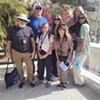Is It Safe to Travel to Israel?
Safety & Security
Is it Safe to Travel to Israel?
Have you ever mentioned to someone that you’d like to visit Israel and received a response along the lines of, “Is it safe to travel to Israel?”
You are not alone! Many visitors have had this response from concerned family and friends (and a few stragners) about travel to the Holy Land. The majority of the time, when Israel is discussed in the news, the focus is on negative events. However, it’s essential to distinguish between rhetoric and reality.
Current Safety Concerns and Perceptions
Before traveling to Israel, it’s essential to prioritize understanding the safety situation. Whether you’re exploring Jerusalem’s ancient streets, Tel Aviv’s bustling markets, or the Dead Sea’s tranquil shores, being aware of safety conditions is crucial. Seek accurate information from reliable sources like government advisories, local authorities, and reputable news outlets. By gathering insights from multiple sources and staying flexible, you can ensure a fulfilling and secure travel experience.
The Reality of Visiting Israel
Indeed, contrary to common assumptions, Israel is one of the safest destinations for travel. Though security issues occur, much like in other countries, most days are lived in peace. Individuals living in Israel speak various languages and worship different religions. Both Arabic and Hebrew are spoken as the official language of the nation. Arabs and Jews both serve in Parliament and other government positions. The majority of the population live in peace and friendship, working side-by-side in work and living as neighbours.
In fact, you are more likely to be a victim to terrorism in most European countries and the United States than you are in Israel!
Safety While Visiting Israel
When venturing to Israel, understanding safety considerations is paramount for a rewarding and secure travel experience. Let’s delve into key aspects to keep in mind:
1. Safety of Tourist Destinations
Israel contains countless iconic tourist destinations, each filled with historical and cultural significance. While these sites are generally safe for visitors, it’s advisable to stay informed about any localized security concerns or restrictions. This information can be found online, with your hotel receptionists and with your Immanuel Tours operator.
2. Transportation Options:
Israel offers various transportation modes, including buses, trains, and taxis, to navigate between cities and tourist sites. Hitch hiking is a common form of transportation here in Israel, however, we strongly advise against traveling in this form. It’s recommended to avoid travel to areas near the Gaza Strip or the West Bank, where security situations can be volatile.
3. Cultural and Religious Considerations
Israel’s rich tapestry of cultures and religions adds a layer of complexity to safety considerations. Respect for local customs and traditions is essential to fostering positive interactions and minimizing potential risks. Visitors should dress modestly when visiting religious sites and be mindful of cultural sensitivities, particularly during religious holidays or events.
In essence, navigating safety in Israel requires a combination of vigilance, cultural awareness, and respect for local customs. By staying informed, exercising caution, and embracing cultural sensitivity, travelers can embark on a fulfilling and secure journey through this captivating destination.
Is Israel Safe for Tourists?
Misconceptions about safety in Israel often arise from media coverage and geopolitical tensions. Despite occasional conflicts, the majority of the country is safe for tourists. Past visitors praise the welcoming culture and historical richness. While isolated incidents may occur, they don’t define the overall experience. Local authorities prioritize tourist safety with security measures at key sites and visible police presence in cities. Like any destination, Israel has risks, but with proper planning and awareness, tourists can mitigate them and enjoy a fulfilling trip.
Safety Measures and Precautions Taken By Immanuel Tours
It is important to remember that millions of visitors come to Israel every year and no incidences occur. We at Immanuel Tours would never put those who travel with us in harm’s way. If we felt any situation arose that made it unsafe, we would be very upfront and work with our groups to ensure not only safety, but peace of mind. We want those who travel to Israel to tour with us to leave wishing they never had to go and understanding why we love this nation so much.
Our commitment to safety assurance is unshakeable. Equipped with superior safety features, our tour buses tour buses offer superior safety and our drivers and tour guides are well-versed in how to respond in every situation, should one arise. Your safety is the most important thing to us and something we work tirelessly to ensure.
Safety in Different Regions of Israel
- Urban Areas:
Urban centers like Tel Aviv and Jerusalem are generally safe for tourists, with vibrant cultural scenes and bustling streets. As in any major city world wide, caution should be taken in crowded areas, especially during peak times or events. - Historical Sites and Religious Landmarks:
Israel’s historical sites, such as the Old City of Jerusalem, Masada, and Caesarea, are popular tourist destinations. While these areas are generally safe, visitors should be mindful of uneven terrain and steep steps at archaeological sites. Additionally, it’s essential to follow safety guidelines and respect heritage preservation efforts to ensure a positive experience for all. Israel is home to sacred religious landmarks for Christians, Jews, Muslims, and other faiths. When visiting religious sites like the Western Wall, the Church of the Holy Sepulchre, or the Dome of the Rock, travelers should dress modestly and observe respectful behavior. Be mindful of cultural sensitivities and religious practices to maintain a harmonious atmosphere. - Natural Attractions:
From the serene shores of the Dead Sea to the rugged landscapes of the Negev Desert, Israel offers diverse natural attractions. While exploring outdoor destinations, such as hiking trails or nature reserves, travelers should stay hydrated, wear sunscreen, and adhere to park regulations. Keep an eye on weather forecasts and be prepared for sudden changes in conditions, especially in desert regions! - Diversity of Safety Experiences:
It’s important to recognize that safety experiences can vary across different regions of Israel. While some areas may present minimal safety concerns, others may require heightened awareness due to proximity to geopolitical hotspots or border regions. When travelling closer to the Gaza strip and into the West bank, we recommend extreme caution and you must adhere to the rules of the area at all times. Travel advisories and detailed explanations can be found on government websites.
Safety Resources and Support While in Israel
Travelers should familiarize themselves with the contact information for their country’s embassy or consulate in Israel. Embassies and consulates can offer support and assistance to citizens in distress, including help with lost passports, medical emergencies, or legal issues.
Travelers can seek assistance and guidance from staff members of their hotel. Hotel concierges and tour guides are knowledgeable about the local area and can offer recommendations, arrange transportation, and provide support in case of emergencies. The Israeli Ministry of Tourism provides information and resources for travelers, including safety tips, travel advisories, and contact details for tourism information centers. Travelers can visit the ministry’s website or contact their offices for assistance and updates on travel-related matters.
Know You’ll Be Safe with Immanuel Tours
So, the next time you hear someone casting doubts on travel safety to Israel, feel confident to reply with a resounding “Yes, it is safe!”.
Here are the key points to remember:
- Stay Informed: Understand the safety landscape in Israel by gathering accurate and up-to-date information from reliable sources such as government advisories, local authorities, and reputable news outlets.
- Know Your Destination: Be aware of safety considerations for different regions of Israel, including urban areas, historical sites, religious landmarks, and natural attractions.
- Be Prepared: Familiarize yourself with resources and support available in case of safety-related emergencies, including local emergency services, tourist police, embassies, and travel insurance providers.
- Respect Local Customs: Show respect for local customs and traditions to foster positive interactions and enhance safety during your travels.
- Plan with Confidence: Make informed decisions about your future trip to Israel by staying informed about safety and security considerations. With proper planning and awareness, you can embark on your journey with confidence and peace of mind.
Emergency services phone numbers:
100 police
101 medical emergencies
102 fire department
Remember, by staying informed and prepared, you can embark on a rewarding and unforgettable journey through the vibrant landscapes and rich cultural heritage of Israel. Plan your future trip with confidence and set forth on an adventure filled with discovery and wonder.












